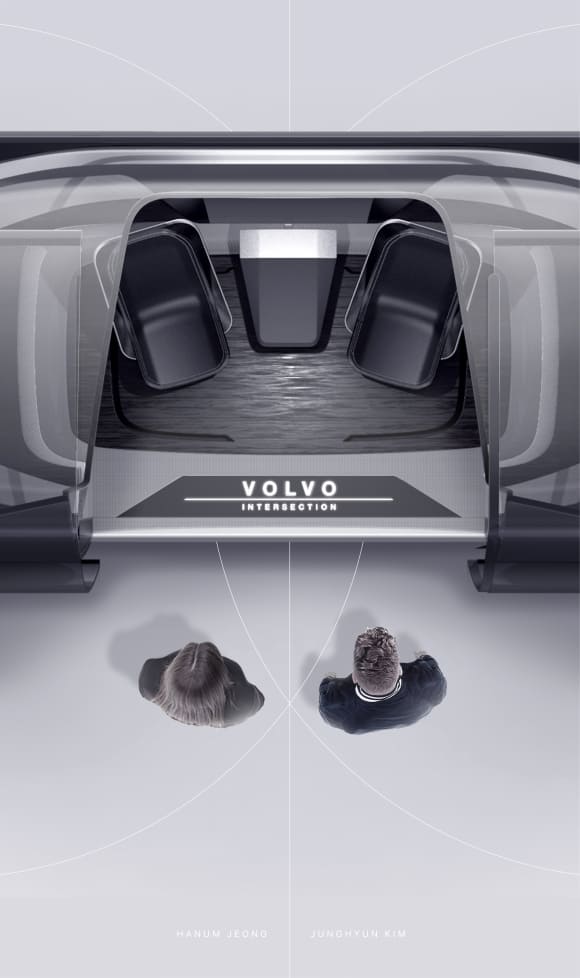 Michellin announced the Winners of the 2019 Michelin Challenge Design, “Inspiring Mobility”
Michellin announced the Winners of the 2019 Michelin Challenge Design, “Inspiring Mobility”
First place: Jintae Tak, Minseok Choi, Doohee Lee and Joonyong Lee of Seoul, South Korea, for design entry “Depot.”
That is, citizens in the future are in need for ‘freedom of space’; freedom to create and possess an individual space in the moment they need. Meanwhile in future automotive industry, advancement and popularization of autonomous driving technology will change the aspect of some elements of a city, for instance, roads and parking spaces. This leads to one conclusion; a series of reorganization on urban area will take place in near future.
 Second place: Robert Crick of London, United Kingdom, for design entry “Renault Fold.” The concept aims to give users the experience of being in a large spacious chauffeured vehicle but in the package of a tiny electric city car. The overall aesthetic of the vehicle will aim to convey individual freedom through the expression of creative identity.
Second place: Robert Crick of London, United Kingdom, for design entry “Renault Fold.” The concept aims to give users the experience of being in a large spacious chauffeured vehicle but in the package of a tiny electric city car. The overall aesthetic of the vehicle will aim to convey individual freedom through the expression of creative identity.
 Third place: Junghyun Kim and Hanum Jeong of Seoul, South Korea, for design entry “Volvo Intersection.”Volvo Intersection is an autonomous vehicle concept for the relationship between people in the future of New York. We conducted the concept based on the emotion of joy.
Third place: Junghyun Kim and Hanum Jeong of Seoul, South Korea, for design entry “Volvo Intersection.”Volvo Intersection is an autonomous vehicle concept for the relationship between people in the future of New York. We conducted the concept based on the emotion of joy.
The three winning designs and 12 finalists were chosen by the jury from more than 1,500 entrants representing 71 countries. In the past 19 years, Michelin Challenge Design has received more than 14,000 entries from 134 countries.
Representatives from the first-, second- and third-place winners are invited as guests at the “Movin’On Summit,” the premier global sustainable mobility event held in Montreal. The winners and their designs will be recognized during a private reception and awards ceremony at Movin’On. Winners will also participate in a private portfolio review with members of the jury.
“The discussion that we are hearing in the mobility sector is primarily around technology. We wanted to use Michelin Challenge Design as a catalyst — a way to get to the root emotion and core question that we want that technology to answer. That is a very underserved part of the mobility discussion,” said Ben Ebel, lead user experience designer, Michelin North America, and chairman of Michelin Challenge Design.
“We’ve forgotten about the journey,” Ebel said. “Whenever we talk about mobility, it’s all about efficiency and movement. Whether it be people or boxes. In fact, a lot of multimodal systems don’t differentiate between these two. What we are seeing here, in these entries, is a different vision that forces you to humanize the experience.”
Finalists of the 2019 Michelin Challenge Design (in alphabetical order):
Jung-Taek Cho of Gyeonggi-do, South Korea, for design entry “Starbucks Square.”
Mohammed Fahd of Calicut, India, for design entry “SIEMENS Air Rescue Vehicle.”
Komal G. and Amogh Barakol of Bangalore, India; and Cuili Yan of Sichuan, China, for design entry “AirSP.”
Siavash Jafari Jozani of Novato, California, United States, for design entry “WAYMO-FLOW.”
Simon Kafmann of Caldaro, Italy, for design entry “Escape.”
Moritz Kirschhoff of Hannover, Germany, for design entry “Urban Islands.”
Miguel Angel Garcia Londono of Medellin, Colombia, for design entry “NIO EXT Extended Mobility.”
Oliver May of Duesseldorf, Germany, for design entry “Lynx.”
Jay Morris of Yateley, Hampshire, United Kingdom, for design entry “NYC Ease.”
Hyojun Shin, Seonghwan Hong and Hyungtaek Lee of Seoul, South Korea, for design entry “Mercedes Benz 800 Pullman.”
Aditya Arun Surti of Pune, Maharashtra, India, for design entry “Renault TRIO.”
Sebastian Weigand of Gemünden am Main, Germany, for design entry “Volkswagen CIT.E.”
In addition, to promote the importance of sketches in the ideation process of mobility design, the jury and program managers have created a new recognition for design sketch. This year, Alberic Chevallier of Nantes, France, was chosen for the design entry “Breathe.”
“Michelin Challenge Design is the most important global design competition for emerging young talent. One of the most exciting things about Challenge Design is that we get entries from all over the world, so it gives us a very unique lens into different cultures, places and geographies. The solutions presented in this program approached the mobility and transportaiton environment through the lens of what makes it a human experience, with focus on freedom, trust, security and especially joy,” said Stewart Reed, Art Center College of Design in California and Michelin Challenge Design jury chairman.